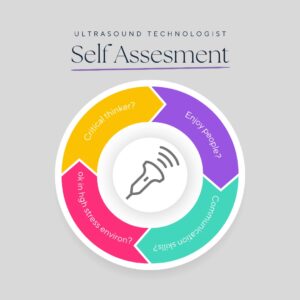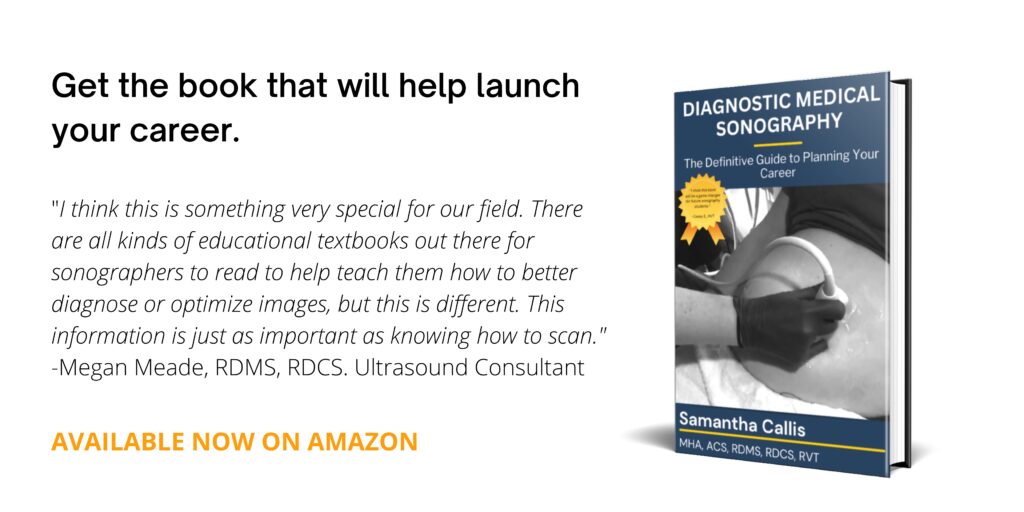Whatever you are, be a good one.
If diagnostic medical sonography is a career you would like to pursue, it is important to understand what is expected skill-wise before you begin your educational journey.
This self-assessment tool is meant for your personal reflection and to help guide you in further research regarding your career choice. It does not reflect a decision in program admittance, employment, or eligibility to sit credentialing examinations.
Ten Things to Ask Yourself Before Pursuing Sonography:
- Do you like working with people? (patients, their loved ones, other care givers, administration)
- Do you have physical capabilities and hand-eye coordination to perform scanning techniques, sit/stand for long hours at a time, work with computer screens in dimly lit rooms, and lift/push/pull heavy equipment or assist with patient movements?
- Do you enjoy challenges that require critical thinking?
- Are you okay with being in high-stress situations?
- Do you work well independently in addition to being part of a team?
- Are your communication skills excellent? (verbal, non-verbal)
- Are you okay with working in an environment that has potential risks—bodily fluids, hazardous materials, musculoskeletal strain, etc.
- Are you willing to work in a profession that frequently requires shift work including evening, nights, holidays, and call-based hours?
- Are you committed to time and costs for maintaining certification and continuing education as required by your employer and credential-granting organization?
- Can you maintain professional composure in emotionally taxing situations, and abide by professional ethical and legal standards required of a healthcare professional?
If you answered “yes” to several of these, you are on the right track! If you answered “no”, take time to explore why. Understanding the profession fully prior to applying to and starting programs is extremely important to successfully completing a program and may improve job satisfaction upon entry into the workforce.
Job shadowing, speaking with a sonographer, attending program information sessions, seeking advice from a counselor or a college advisor are all ways to help you determine if this is something you would truly like to pursue before investing a significant amount of time and money into your education.
What makes a good sonographer? The answer often depends on who is asking. Professional societies, educational programs, employers, and accrediting bodies all have their own documents with their own jargon.
Do You Fit the Job Description?
The Society for Diagnostic Medical Sonography (SDMS) most recently revised the model job description for a staff sonographer in 2016. The listed essential functions fell into the following categories:
- Performance of Sonography
- Equipment Use and Maintenance
- Documentation and Reporting
- Quality Assessment/Quality Improvement
- Health Care Team Interaction
- The Joint Review Committee on Diagnostic Medical Sonography (JRCDMS) is the body that recommends diagnostic medical sonography programs for accreditation through the Commission on Accreditation of Allied Health Education Programs (CAAHEP). The CAAHEP standards and guidelines mandate that accredited sonography programs prepare “competent, entry-level sonographers” in the following domains:
- Cognitive → knowledge
- Psychomotor → skill
- Affective → behavior
The CAAHEP description of profession lists further important job duties common to sonographers in multiple practice specialties. “The general sonographer, adult cardiac sonographer, pediatric cardiac sonographer, and vascular technologist are able to perform the following:
- Obtain, review, and integrate pertinent patient history and supporting clinical data to facilitate optimum diagnostic results
- Perform appropriate procedures and record anatomic, pathologic, and/or physiologic data for interpretation by a physician
- Record, analyze, and process diagnostic data and other pertinent observations made during the procedure for presentation to the interpreting physician;
- Exercise discretion and judgment in the performance of sonographic and/or other diagnostic services
- Demonstrate appropriate communication skills with patients and colleagues
- Act in a professional and ethical manner
- Provide patient education related to medical ultrasound and/or other diagnostic vascular techniques and promote principles of good health.”
Start With a Performance Evaluation in Mind
The Society for Diagnostic Medical Sonography (SDMS) Scope of Practice and Clinical Standards Document (SDMS, 2015) breaks down clinical standards into four sections:
| Section I | Section II | Section III | Section IV |
|---|---|---|---|
|
|
|
|
Scope of practice describes professional activities a person may perform in their line of work subject to Federal and state laws, accreditation standards, and lawful facility policies and procedures .
Another way to evaluate whether or not sonography would be a suitable career is to start with the end in mind—performance evaluations or performance appraisals are commonly used in healthcare organizations and other workplaces at various time intervals of employment to assess your workplace performance including job duties, goals, areas of strengths/weaknesses, and opportunities for further improvement and growth.
Performance evaluations are used for newly hired individuals (often with shorter, more frequent check-ins) during onboarding and on an annual basis for established employees. Appraisals are often important for maintaining employment and being eligible for certain bonuses and wage raises.
Common components of a performance appraisal include:
- Acknowledging current or updated job description
- Self-assessment of strengths, weaknesses, and opportunities for growth related to technical performance, patient care, and organization mission and values
- Peer evaluation of strengths, weaknesses, and opportunities for growth related to technical performance, patient care, and organization mission and values
- Administration review of strengths, weaknesses, and opportunities for growth related to technical performance, patient care, and organization mission and values
In summary, there are many ways to evaluate the scope and skill of a sonographer that vary slightly between professional societies, program accrediting organizations, educational programs, and employers.
However, commonalities among these generally require that a sonographer possess the knowledge and behaviors as well as the technical skill to perform and evaluate sonographic examinations for the purpose of assisting ordering physicians in patient diagnosis.
The following are resources utilized to create this self-assessment if you want to explore further:
- SDMS Scope of Practice Document
- SDMS Model Job Description- Staff Sonographer
- Bureau of Labor Statistics Job Description
- JRCDMS Standards
Related Articles


 Learn more about a career in ultrasound in Samantha’s new book, “
Learn more about a career in ultrasound in Samantha’s new book, “